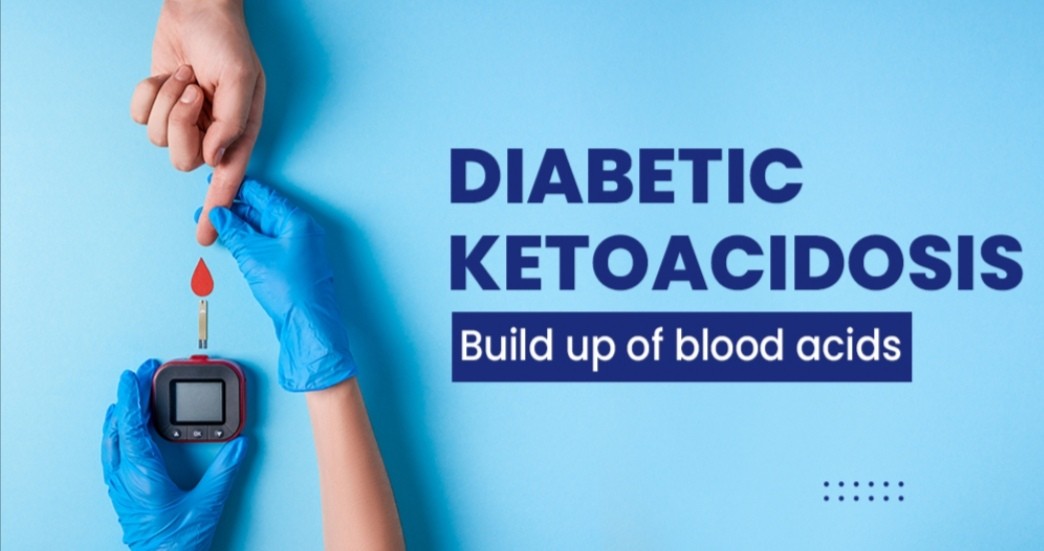Published - Sat, 15 Oct 2022

Diabetic Ketoacidosis (DKA): Etiology, Clinical features & Treatment
In insulin-dependent patients, diabetic ketoacidosis is characterized by hyperglycemia, ketonemia, and acidosis.
ETIOLOGY
Diabetic ketoacidosis is caused by a relative or absolute deficiency of insulin and increased levels of stress hormones (e.g., catecholamines, cortisol, growth hormone). Insulin deficiency leads to lipolysis, which in turn leads to the production of ketone bodies, resulting in acidosis.
PRECIPITATING FACTORS include lack of insulin, infection, injuries, emotional stress, alcohol use, myocardial infarction, and cerebrovascular accident.
CLINICAL FEATURES
1. Symptoms: Nausea, vomiting, abdominal pain, polyuria and polydipsia, and altered mental status.
2. Physical examination findings
a) Kussmaul respirations (i.e., rapid, deep breathing) may be noted, and the breath often smells like acetone.
b) Dehydration may be reflected by hypotension, reflex tachycardia, dry skin, and dry mucous membranes.
DIFFERENTIAL DIAGNOSES
Hypoglycemia, nonketotic hyperosmolar coma, isopropyl alcohol ingestion, alcoholic ketoacidosis, lactic acidosis, uremia, toxin ingestion, and starvation ketosis must be ruled out.
EVALUATION
Laboratory studies:
1. A provisional diagnosis can be obtained via blood gas and bedside glucose determinations.
a) There will be signs of hyperglycemia, which is indicated by a blood glucose level of at least 300 mg/dL.
b) Metabolic acidosis is demonstrated by a serum bicarbonate concentration of less than 15 mEq/L and a pH of less than 7.3.
2. A serum biochemical profile (including electrolytes, blood urea nitrogen [BUN], and creatinine levels), urinalysis, and ketone levels confirm the diagnosis.
a) Ketonemia results from -hydroxybutyrate and acetoacetate. Qualitative tests (e.g., the nitroprusside test) detect acetoacetate but not β-hydroxybutyrate.
b) Depending on the patient's level of hydration, electrolyte imbalances may exist.
3. Other studies, such as a complete blood count (CBC), a chest radiograph, or an electrocardiogram (ECG), may be indicated to identify precipitating causes.
THERAPY
1. Normal saline should be administered at an initial rate of 1 L/hour for the first 2 to 3 hours. The average fluid deficit is 5 to 10 L. Clinical response and urine output are the best indicators of fluid status.
2. Insulin is administered intravenously as a continuous infusion using a low-dose technique (i.e., 5 to 10 U/hour) until the ketonemia and acidosis have resolved.
3. Potassium (20 mEq/L) should be added to the intravenous fluids during early therapy to correct the profound potassium deficiency associated with diabetic ketoacidosis. During the first day of treatment, the patient usually requires 100 to 200 mEq of potassium.
4. Phosphate: Whether phosphate replenishment is required is debatable. Phosphate is given either orally or intravenously if the patient’s serum phosphate level decreases to below 1 mg/dL.
DISPOSITION
Most patients with diabetic ketoacidosis need to be admitted, often to an intensive care unit (ICU). In patients with mild diabetic ketoacidosis, the ketoacidosis may resolve in the emergency department. These patients should be placed under observation until any underlying precipitating causes can be ruled out.
Created by
Rigomo Team
Rigomo is a leading online education platform that offers a wide range of courses to help individuals enhance their skills and achieve their career goals. With our user-friendly interface and expert instructors, we strive to provide high-quality education to everyone, anytime and anywhere. Join us today and take the first step towards a brighter future.
Rigomo is an e-learning platform that was founded in 2019 by a team of dedicated professionals with a passion for revolutionizing the way people learn. The platform offers a range of online courses that cover various industries, including business, technology, healthcare, and more.
Rigomo's courses are designed to be interactive and engaging, with a focus on practical skills that learners can apply in their careers. The platform uses a combination of video lectures, quizzes, and hands-on projects to help learners master the subject matter.
Rigomo is committed to providing affordable and accessible education to people around the world. The platform offers a range of pricing options, including monthly and annual subscriptions, as well as pay-as-you-go options for individual courses.
Since its launch, Rigomo has received numerous accolades for its innovative approach to e-learning. The platform has helped thousands of learners across the globe acquire new skills and advance their careers.
As Rigomo continues to grow, the team remains committed to providing high-quality education that is accessible to all. The platform is constantly updating its courses and features to ensure that learners have access to the latest tools and technologies.
Comments (0)
Search
Popular categories
Health and Wellness
231Skill Development
7Technology
5Community Impact
2Success story
2Creativity
1Latest blogs

DeepSchool: The Story of an Idea That Refused to Sit Still
Tue, 02 Dec 2025

Transforming Emergency Care: The Story Behind Rigomo's Revolutionary PPMMP Course
Sun, 12 May 2024

Empowering Rural Healthcare: How Pogiko's AI is Bridging the Gap in Medical Services
Thu, 25 Apr 2024

Write a public review